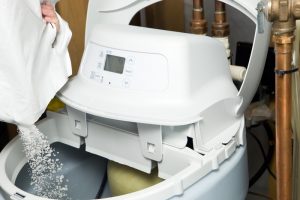 It is hard to believe that our water can be anything but wet, so what does it mean to have hard water? Many homeowners take the water that enters into their homes for granted and don’t really think too much about quality, as filtration systems are set up to block contaminants from entering the supply. However, you could be experiencing the effects of hard water, even with the best filtration system in place. So what do you do?
It is hard to believe that our water can be anything but wet, so what does it mean to have hard water? Many homeowners take the water that enters into their homes for granted and don’t really think too much about quality, as filtration systems are set up to block contaminants from entering the supply. However, you could be experiencing the effects of hard water, even with the best filtration system in place. So what do you do?
A water softener in Orlando, FL is the best solution for hard water. Installing a new water softener can mitigate the negative effects that hard water can have on appliances like dishwashers and washing machines, as well as various pipes and fixtures throughout your home. So, how do you know if you have hard water? Well, keep reading below! We have listed some of the tell-tale signs that your water is just too hard.
What is Hard Water?
Hard water is water with high concentrations of magnesium and calcium particles. Though these particles do not pose a threat to your health and safety, they can wreak quite a bit of havoc on your plumbing system and appliances. Long term exposure to these mineral particles will lead to limescale build-up, restricting water flow and causing damage to your pipes as it hardens.
Signs That You Have Hard Water
Soap Scum in Bathtub or Shower
A rapid build-up of soap scum might suggest that you have hard water in your home. The minerals found in hard water prevent soap from dissolving, causing it to stick around after your bath or shower.
Water Spots on Glasses and Dishes
Have you ever looked at your glassware after running your dishwasher and noticed little water spots along the surface? Water spots are the result of mineral residue left behind from hard water. Calcium and magnesium build-up in your dishwasher can negatively impact its function by restricting the flow of water in and out of the appliance, leading to damage and ineffectiveness.
Yellow or White Residue Around Sinks and Drains
This is a tell-tale sign that you have hard water in your plumbing system. The same mineral deposits that you see outside of your pipes are likely accumulating inside your pipes. When this limescale hardens, you will likely need to replace your pipes much sooner than later.
Clogged Showerheads
Mineral deposits can end up clogging your showerheads, which makes for a not-so-great shower experience. Over time, the showerhead can become so clogged that no amount of water will be allowed through, leading to a need for replacement.
Residue on Hair and Skin
Hard water can leave a residue on your hair and skin. Your hair may feel slimy, lack volume, or be hard to style after it has been dried. You also may notice that your skin feels dry. This is because the minerals in hard water are likely diluting the shampoo or body wash you use, reducing their effect on your body.
Your Clothes Don’t Feel Clean
Just as it prevents soap from dissolving inside your bathtub, hard water can have the same effect inside of your washing machine. This can prevent clothes from rinsing off or can make them stiff after they come out of the dyer. It can also cause colors to fade much faster than they would have otherwise.
If You Suspect You Have Hard Water…
Call a plumber for water softener installation services! A water softener will help reduce minerals found in the water supply, thus mitigating the effects of hard water on your plumbing system.
